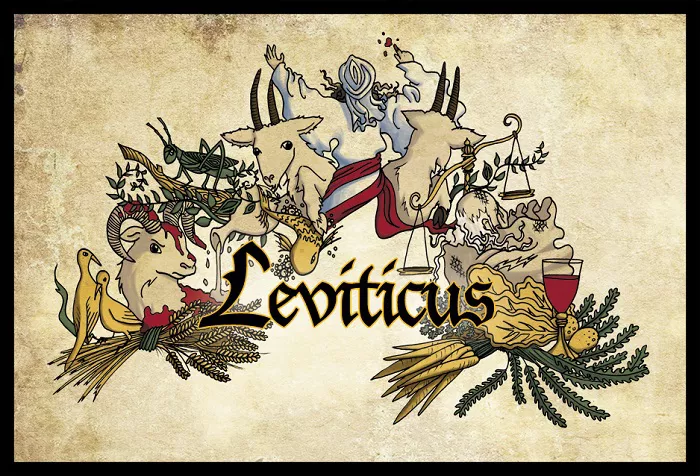Understanding the Context
The Book of Leviticus is the third book of the Hebrew Bible and the Christian Old Testament. It is named after the Levites, the tribe of Israel entrusted with religious duties. Leviticus primarily consists of God’s laws given to Moses on Mount Sinai, detailing how the Israelites should live and worship.
The Law and Holiness
Leviticus emphasizes the theme of holiness. The phrase “Be holy, for I am holy” appears several times. Holiness means being set apart for God. It involves moral and ritual purity. Leviticus teaches the Israelites how to maintain this purity.
The Sacrificial System
A significant portion of Leviticus deals with sacrifices. Sacrifices were central to Israelite worship. They were a way to atone for sins, express gratitude, and maintain fellowship with God. The book outlines various offerings:
Burnt Offerings
These symbolize complete dedication to God.
Grain Offerings
These express thankfulness for God’s provision.
Peace Offerings
These signify peace and fellowship with God.
Sin Offerings
These are for atonement of unintentional sins.
Guilt Offerings
These address specific sins and require restitution.
The Priesthood
Leviticus also details the roles and responsibilities of the priests. The priests, primarily from the tribe of Levi, acted as mediators between God and the people. They conducted sacrifices, taught the law, and maintained the sanctuary. The consecration of Aaron and his sons in Leviticus 8-9 highlights the importance of the priesthood.
Clean and Unclean
The concepts of clean and unclean are crucial in Leviticus. They apply to food, diseases, and various bodily conditions. Being clean or unclean affects a person’s ability to participate in worship. The distinction underscores the importance of purity in approaching God.
Dietary Laws
Leviticus 11 outlines dietary laws. Certain animals are considered clean and others unclean. These laws set Israel apart from other nations. They also teach obedience and remind the Israelites of their covenant with God.
See Also: How Many Laws in Leviticus: A Detailed Examination
Moral and Ethical Instructions
Leviticus contains many moral and ethical instructions. Leviticus 18-20 addresses sexual ethics, honesty, justice, and neighborly love. These chapters include the famous commandment: “Love your neighbor as yourself.” These instructions are foundational for living a life pleasing to God.
The Day of Atonement
Leviticus 16 describes the Day of Atonement, or Yom Kippur. This is the most solemn day in the Jewish calendar. It involves the high priest making atonement for the sins of the nation. The rituals include the scapegoat, which symbolically carries the sins of the people into the wilderness. This day highlights the seriousness of sin and the need for atonement.
Holy Days and Festivals
Leviticus 23 outlines the annual feasts and holy days. These include the Sabbath, Passover, Unleavened Bread, Firstfruits, Weeks (Pentecost), Trumpets, Day of Atonement, and Tabernacles. These festivals are times of worship, remembrance, and community. They remind Israel of God’s past deeds and His ongoing provision.
Social Justice
Leviticus also addresses social justice. Leviticus 25 discusses the Year of Jubilee. Every fifty years, debts are forgiven, slaves are freed, and land is returned to its original owners. This ensures economic balance and prevents perpetual poverty. It reflects God’s concern for justice and compassion.
Theological Significance
Leviticus is theologically significant for several reasons:
God’s Holiness
The book repeatedly emphasizes God’s holiness and the requirement for His people to be holy.
Atonement and Sacrifice
Leviticus foreshadows the ultimate atonement through Jesus Christ. The sacrificial system points to the need for a perfect sacrifice for sin.
Covenant Relationship
The laws and rituals reinforce the covenant relationship between God and Israel. They show how to live in obedience to God.
Community and Worship
Leviticus emphasizes the importance of communal worship and living. It provides guidelines for a community set apart for God.
Application for Today
While many of the specific laws in Leviticus are not directly applicable today, the principles behind them remain relevant. Here are a few ways Leviticus is important for contemporary believers:
Holiness
Christians are called to live holy lives. This means being set apart for God and living according to His standards.
Worship
The importance of worship and reverence for God is emphasized. Worship involves more than just rituals; it is a way of life.
Atonement
The concept of atonement is fulfilled in Jesus Christ. Understanding Leviticus helps appreciate the depth of Christ’s sacrifice.
Community
Leviticus highlights the importance of living in a godly community, caring for others, and practicing justice and compassion.
Ethics and Morality
The ethical teachings of Leviticus, such as loving your neighbor, are still foundational for Christian living.
Conclusion
The Book of Leviticus is often overlooked, yet it holds profound significance. It teaches about holiness, atonement, and the proper way to worship God. It provides moral and ethical instructions that are timeless. For both Jews and Christians, Leviticus offers a deeper understanding of God’s character and His requirements for His people. By studying Leviticus, believers can gain insights into living a life that honors God and reflects His holiness.


